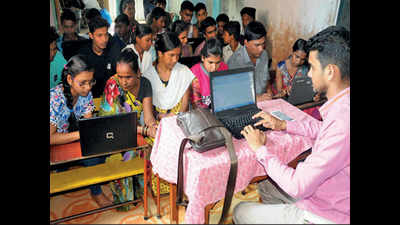- News
- City News
- ahmedabad News
- Gujarat gets India’s biggest teacher training initiative
Trending
This story is from August 18, 2019
Gujarat gets India’s biggest teacher training initiative
Balvantsinh Parmar, a primary schoolteacher in Morva, Panchmahal, wanted to curb the drop-out rate among students

Picture used for representational purpose only
AHMEDABAD: Balvantsinh Parmar, a primary schoolteacher in Morva, Panchmahal, wanted to curb the drop-out rate among students. When he studied the problem, he realized that a large number of students were not comfortable with the language of textbooks because their mother tongue was Bhili. Parmar took up the challenge to help his students surmount the language barrier.
He used local words in charts and created rhymes and songs to keep the students engaged. The innovation worked and the number of students swelled five-fold. His ‘Vigyan Geet’ (song of science) has been adopted by other schools.
Parmar’s innovation is one of the 300 in the ‘Innovation Bank’ of Samarth II initiative launched on Friday by IIM-Ahmedabad’s Ravi J Matthai Centre for Educational Innovation (RJMCEI). The initiative, in association with the Government of Gujarat and Sarva Shiksha Abhiyan (SSA), covers 1,52,788 government schoolteachers in the state.
P Bharthi, the state project director of SSA, said that the programme follows the successful Samarth I last year that had covered 18,950 science and mathematics teachers of class VI to VIII. “It is the biggest state-level teacher training programme in India,” she said, adding that the aim of the initiative is to improve students’ cognition and understanding of specific subjects.
Prof Vijaya Sherry Chand of RJMCEI at IIM-A said that the initiative is designed to focus on self-efficacy of teachers. “We ask the teachers to think about issues related to children’s learning, think about solving them, do something and track the changes,” he said, adding that the Innovation Bank has varied cases ranging from teaching basics of a language to mathematical concepts. The teachers can adopt the best practices. “The earlier version of the initiative taught us that peer-to-peer learning is an effective tool for improvement,” Chand said.
He used local words in charts and created rhymes and songs to keep the students engaged. The innovation worked and the number of students swelled five-fold. His ‘Vigyan Geet’ (song of science) has been adopted by other schools.
Parmar’s innovation is one of the 300 in the ‘Innovation Bank’ of Samarth II initiative launched on Friday by IIM-Ahmedabad’s Ravi J Matthai Centre for Educational Innovation (RJMCEI). The initiative, in association with the Government of Gujarat and Sarva Shiksha Abhiyan (SSA), covers 1,52,788 government schoolteachers in the state.
P Bharthi, the state project director of SSA, said that the programme follows the successful Samarth I last year that had covered 18,950 science and mathematics teachers of class VI to VIII. “It is the biggest state-level teacher training programme in India,” she said, adding that the aim of the initiative is to improve students’ cognition and understanding of specific subjects.
A study carried out by the state government in April 2019 — covering 43 lakh students from class III to VIII in schools run with government grants — had revealed that 81.5% students were not able to read or write Gujarati fluently. And 81% and 67.5% students scored less than 50% marks in science and social studies respectively.
Prof Vijaya Sherry Chand of RJMCEI at IIM-A said that the initiative is designed to focus on self-efficacy of teachers. “We ask the teachers to think about issues related to children’s learning, think about solving them, do something and track the changes,” he said, adding that the Innovation Bank has varied cases ranging from teaching basics of a language to mathematical concepts. The teachers can adopt the best practices. “The earlier version of the initiative taught us that peer-to-peer learning is an effective tool for improvement,” Chand said.
End of Article
FOLLOW US ON SOCIAL MEDIA











